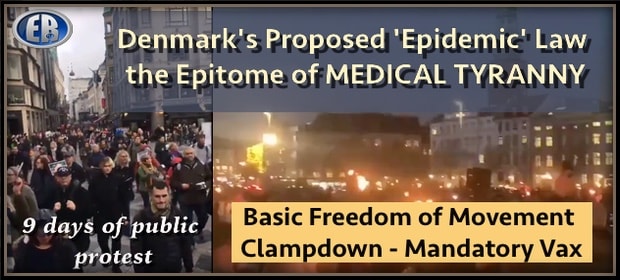
ER Editor: UPDATE – A lady on Twitter living in Denmark has revealed, with immense joy, that the law has been overturned (“thrown into the bin”) or some such good news for the Danish people. However, we so far have no independent confirmation of that. Here is the tweet, dated yesterday Nov. 15:

**
On Twitter, there have been some video clips of Danish people protesting, over at least 9 days, against the hugely tyrannical potential of the proposed government bill. Links are provided below.

See also this and this.
A couple of things occur to us: first, that a small EU country is being trialled with this legislative medical madness, a country with a far smaller population and less media exposure. Second, that if you take into account the professional associations below who are critical of this, there has to be a powerful hand pushing this law on the ruling Social Democrat party. For all our sakes, let’s hope the protests prevail.
********
EXPLAINED: What is Denmark’s proposed ‘epidemic law’ and why is it being criticised?
THE LOCAL.DK
Published to The Liberty Beacon from EuropeReloaded.com
![]()
••••
The Liberty Beacon Project is now expanding at a near exponential rate, and for this we are grateful and excited! But we must also be practical. For 7 years we have not asked for any donations, and have built this project with our own funds as we grew. We are now experiencing ever increasing growing pains due to the large number of websites and projects we represent. So we have just installed donation buttons on our websites and ask that you consider this when you visit them. Nothing is too small. We thank you for all your support and your considerations … (TLB)
••••
Comment Policy: As a privately owned web site, we reserve the right to remove comments that contain spam, advertising, vulgarity, threats of violence, racism, or personal/abusive attacks on other users. This also applies to trolling, the use of more than one alias, or just intentional mischief. Enforcement of this policy is at the discretion of this websites administrators. Repeat offenders may be blocked or permanently banned without prior warning.
••••
Disclaimer: TLB websites contain copyrighted material the use of which has not always been specifically authorized by the copyright owner. We are making such material available to our readers under the provisions of “fair use” in an effort to advance a better understanding of political, health, economic and social issues. The material on this site is distributed without profit to those who have expressed a prior interest in receiving it for research and educational purposes. If you wish to use copyrighted material for purposes other than “fair use” you must request permission from the copyright owner.
••••
Disclaimer: The information and opinions shared are for informational purposes only including, but not limited to, text, graphics, images and other material are not intended as medical advice or instruction. Nothing mentioned is intended to be a substitute for professional medical advice, diagnosis or treatment.

Leave a Reply